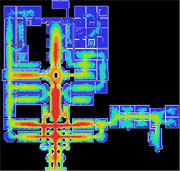 space syntax is a science-based, human-focused approach that investigates relationships between spatial layout and a range of social, economic and environmental phenomena.
space syntax is a science-based, human-focused approach that investigates relationships between spatial layout and a range of social, economic and environmental phenomena.
These phenomena include patterns of movement, awareness and interaction; density, land use and land value; urban growth and societal differentiation; safety and crime distribution.
Space syntax was pioneered in the 1970s by Prof Bill Hillier, Prof Julienne Hanson and colleagues at The Bartlett, University College London. Today, space syntax is used and developed in hundreds of universities and educational institutions as well as professional practices worldwide. Built on quantitative analysis and geospatial computer technology, space syntax provides a set of theories and methods for the analysis of spatial configurations of all kinds and at all scales.
Research using the space syntax approach has shown how:
– movement patterns are powerfully shaped by spatial layout
– patterns of security and insecurity are affected by spatial design
– this relation shapes the evolution of the centres and sub-centres that makes cities liveable
– spatial segregation and social disadvantage are related in cities
– buildings can create more interactive organisational cultures.
Research areas
The space syntax approach was conceived to help architects simulate the likely effects of their designs on the people who occupied and moved around in them, be they buildings or urban settlements. It has since grown around the world in a variety of research areas and practical applications including archaeology, criminology, information technology, urban and human geography, anthropology and cognitive science.
Practical applications
In practice, space syntax provides a set of planning and design principles as well as a toolkit for the generation and evaluation of ideas.
“Live” projects raise fundamental research questions that are fed back from practice to university. The result is a process of knowledge exchange and co-creation that stimulates innovation, facilitates practice and, ultimately, benefits our buildings and cities.
Introduction to Space Syntax presents an illustrated overview of space syntax theory and technology. It also provides examples of the use of space syntax in practice by Space Syntax Limited, the consulting company created by University College London.
Professor Alan Penn, former Dean at The Bartlett, University College London, explains how the process works:
